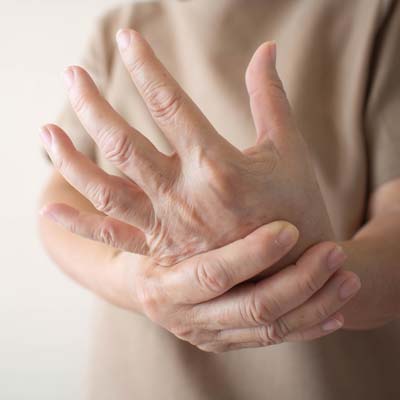What Treatments Can I Do For Peripheral Neuropathy

In last week’s blog, we discussed diabetes—from what diabetes is, the different types, how to manage it, and even risk factors. What we didn’t talk about was the possible complications that can come from unmanaged diabetes. Diabetes is a complex disease that comes with many different complications like cardiovascular disease, kidney damage, hearing impairment, and more.
One of the most prominent complications of diabetes is a condition called peripheral neuropathy. Peripheral neuropathy is a complex disease that damages the nervous system. With that being said, this week’s blog will focus on proper education and understanding of what peripheral neuropathy is, some causes of it, symptoms of peripheral neuropathy, and how to treat and manage it.
To start with, what is peripheral neuropathy anyway?
Peripheral neuropathy, or neuropathy as it is often called, is the result of damage to the nerves that causes pain, tingling, numbness and weakness, usually in the hands and feet. In a person with diabetes, the increase of glucose (sugar) in the blood causes damage to the nerves and even small blood vessels. When these vessels are damaged, oxygenation is also impaired. The lower extremities need adequate circulation in order to keep the tissues alive and healthy. If oxygenation is impaired, sensation may also be impaired. It is recommended that individuals who have neuropathy see a podiatrist. The reason behind this is because if people with neuropathy get injured on their foot, they may not be able to feel it. If that injury goes unnoticed long enough a sore or even an infection can occur.
Diabetes is not the only cause of neuropathy. It can also be caused by Lyme disease, chemotherapy treatments, and other unknown reasons (Idiopathic). There are always several lifestyle factors that increase one’s risk for developing neuropathy: pre-diabetes, chronic alcohol misuse, vitamin B deficiency, sedentary habits, genetics, and more.
When questioning if you or someone you know is potentially developing neuropathy, you want to look for three main symptoms: 1) numbness, 2) tingling, and 3) pins and needles in the hands and/or feet. Usually the symptoms are first found in both feet and may then migrate to the hands; however, every case is different. It is also important to discuss any of these symptoms with your healthcare provider to find out about your specific possible risk factors for developing neuropathy.
As you can see this condition is a very serious one that must be managed on a daily basis. If the cause of neuropathy is from diabetes, then the diabetic must first manage their blood sugar in order to truly manage their neuropathy symptoms. Diet and exercise plays a major role in developing and managing neuropathy symptoms.
Another neuropathy management tip is if you have neuropathy, try increasing protein within your diet. Having adequate protein levels is essential for proper healing, especially in wounds. If your protein levels are below adequate, then the skin is going to have difficulty remaining intact.
In order to prevent complications from neuropathy, individuals with neuropathy are encouraged to never walk barefoot. Walking without shoes imposes the risk of stepping on something sharp and unknowingly cutting their foot, without them feeling it. These individuals are also encouraged to wear white socks rather than black ones. The rationale is so therefore if the foot is bleeding you will be able to visualize it on the white socks, versus it being hidden on the black ones.
There are different ways to treat neuropathy. While medication is a common way to treat the symptoms of neuropathy, there are several holistic methods that may also help with symptoms. Some of these methods are MicroVas, Power Plate, wearing orthotics, and taking supplements.
MicroVas is an electrical stimulation that helps to bring blood flow to the hands and/or feet by muscle contractions. PowerPlate is a 3D vibrational treatment that stimulates nervous system and blood flow. These treatments may take up to 2-4 weeks to see some improvements. If no improvement is seen after 4-6 weeks, chances are it won’t help. There are some contraindications to these treatments, so always consult with a healthcare provider before trying on your own.
Orthotics are another great option for treatment of neuropathy. When we say orthotics, we are referring to the ones that are crafted specifically for your feet. Not some cookie cutter ones off the shelf. Orthotic fittings are done by chiropractors, podiatrists, and even some orthopedics.
Some other natural methods for managing neuropathy symptoms include consistently exercising, supplementing with Alpha Lipoic Acid and Vitamin B. With the proper prevention and treatment, neuropathy is a condition that can be managed, reduced, and may even be free of complications. If you or someone you know has or is at risk for developing neuropathy, call our office at 732-270-2811 to make an appointment. This can be the first step to managing and creating a plan for your neuropathy.
